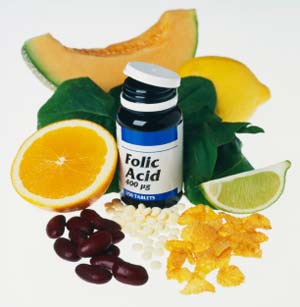Vitamin supplements continue to be a multi-billion dollar industry despite the fact that multiple large population studies have failed to show any benefit to health in well-nourished individuals. Indeed, people who consume daily high doses of some vitamins may increase their risk of certain cancers. For example, in two separate studies, smokers who took daily beta carotene supplements had a higher risk of developing lung cancer than smokers who did not.
Another supplement that has been linked to increased cancer risk is folic acid. On the other hand, naturally-occurring folate in food may be beneficial. Here is a CTV.ca/health blog I posted in 2009 that reported on an increased risk of prostate cancer in men who took folic acid supplements.
Another supplement that has been linked to increased cancer risk is folic acid. On the other hand, naturally-occurring folate in food may be beneficial. Here is a CTV.ca/health blog I posted in 2009 that reported on an increased risk of prostate cancer in men who took folic acid supplements.
Folic acid and prostate cancer: Too much of a good thing?
by Dr. Lorne Brandes March 13, 2009
This week brings yet another cancer study pointing to the potential danger of a vitamin supplement. This time it's folic acid, a synthetic form of folate, one of the essential B-complex vitamins that naturally occurs in green leafy vegetables (the word folate is derived from folium, Latin for "leaf").
In addition to playing a vital role in the production of our cells' DNA, folate is essential for the normal development of the nervous system in the fetus and also for preventing anemia. Short and simple, folate is necessary for life.
Now for the bad news.
In a paper just published in the Journal of the National Cancer Institute, researchers from the University of Southern California studied the development of prostate cancer in 643 men who were randomized to take a daily placebo pill or a daily 1 mg folic acid pill.
Here's the story on CTV.ca: Folic acid linked to higher risk of prostate cancer
Somewhat shockingly, after 10 years of follow-up, those who took folic acid had a prostate cancer rate 2.6 times higher than those who took the placebo!
It should be pointed out that the prostate cancer study was actually an extension of another published study, conducted between 1994 and 2006, called the Aspirin/Folate Polyp Prevention Study (AFPP). That study, published in the Journal of the American Medical Association, found that while aspirin reduced the risk of colon polyps, folic acid appeared to increase the risk of advanced and multiple polyps.
Should we be concerned by these findings? No and yes.
No, because the current study is rather small. As a result, its conclusion that folic acid supplements may be associated with an increased rate of prostate cancer could be due to chance alone. Indeed, blood tests in the two groups of men showed no significant difference in folate levels to account for the observed increase in prostate cancer in men who took folic acid.
Yes, because in the 1940s, Dr. Sidney Farber observed that giving folic acid to children with acute leukemia actually made the disease worse. He reasoned that, since folate increases the production of DNA, it may actually have caused the leukemia cells to divide faster.
Acting on Farber's hunch, his colleague, Dr. Y. Subbarao, Research Director at Lederle Laboratories, soon formulated an anti-folate drug, called methotrexate, that prevents the vitamin from building DNA. The result? Not only was methotrexate the first effective drug treatment for acute leukemia, it is still a mainstay in the treatment of many cancers!
Clearly, then, folate appears to be a double-edged sword: not enough and health suffers; too much and adverse effects, such as increased cell division, possibly resulting in cancer, may result.
The story is also complicated by the fact that folic acid as a supplement may fundamentally differ from natural folate in its biological effects. For example, studies suggest that folate (as opposed to folic acid) may actually protect against stomach and pancreatic cancer.
Yet, because cereals and other grains are now being fortified with folic acid, it is becoming increasingly difficult to separate naturally-occurring folate from the synthetic form in many of the foods we eat. As a result, and because of the studies reported here, I would be concerned that too much fortification could tip the balance from benefit to risk.
That aside, once again the bottom line is this: get your vitamins naturally, in the good food you eat, rather than in a bottle from the health food store. With each new published study comes increasing evidence that, as opposed to a healthy diet rich in fruits and vegetables, most vitamin and mineral supplements do you no additional good and, in some cases, may cause harm.

 RSS Feed
RSS Feed
